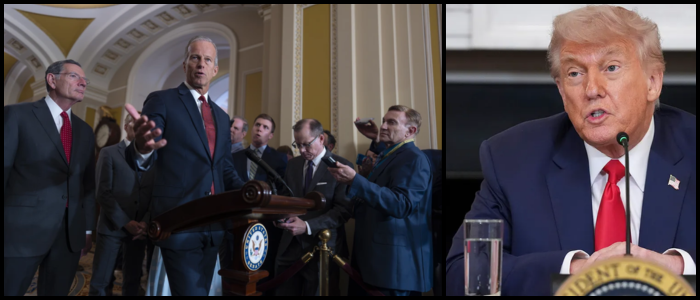"It's beyond what the House did," Maine Republican Senator Susan Collins said of the Senate's planned cuts to Medicaid, and the vote would likely come after only a few hours of floor debate. Lawmakers are moving quickly to beat the president's July 4 deadline, meeting behind closed doors with administration officials as they try to hash out a bill. The dynamic is similar to the 2017 repeal effort against the Affordable Care Act, which was unsuccessful after then-Senator John McCain's dramatic "no" vote.
Senate Majority Leader John Thune says he is still committed to shepherding the bill, which a vote is due by the end of the week. He argued for the proposal, which he described as a good bill that would help the country's takeoff and bring financial relief to Americans. The health care cuts, especially to Medicaid, are a key part of the GOP plan to pay for its proposed tax cuts. If this legislation is not approved, taxes will increase next year when current tax laws expire.
Fears Rise Over Medicaid Cuts And The Affordable Care Act's Rural Impact
The House version of the legislation would take around $1.5 trillion overall in savings, with a large share coming from health care. Medicaid, which grew dramatically under the Affordable Care Act and now covers about 80 million Americans, would be dramatically rolled back to primarily cover low-income women and children. House Democratic Leader Hakeem Jeffries and other Democrats have vehemently opposed the measure, charging it is a Republican attempt to take away healthcare from millions, as the debate intensifies over Senate healthcare proposals.
One of the cost-saving strategies is to require Medicaid recipients to work 80 hours a month, even though most of them do. The other is to change the system for the "provider tax," in which a state taxes hospitals and health care providers, essentially to collect money from them to help fund Medicaid (and return it to them). The House bill would hold the tax at current levels, but the Senate plan implies far deeper cuts. Senator Josh Hawley, Republican of Missouri, stressed that many senators remain unwilling to move forward without first ensuring that some protections are put in place for rural hospitals, which could be decimated.
It's an unfair tax." Senator Roger Marshall, Republican of Kansas, derided the provider tax mechanism, saying it should be repealed while grudgingly accepting that states are heavily reliant on it. But a number of GOP senators worry that if the tax is modified, rural hospitals would be forced to close, further limiting healthcare access in those regions.
Rural Hospital Fund and Final Bill Debate Requests
The proposal to establish a rural hospital fund to offset the effects of Medicaid cuts is designed in response to the pending crisis. GOP senators have talked about adding $15 billion to this fund, though some have called that figure too much and others have said it's not enough. Senator Collins has called for increasing the fund to $100 billion. Thune acknowledged that there will be a fund but said it will not approach that big number.
Hawley, one of the most vocal critics, backs the notion of a fund but wants to see specifics on how it would be structured and distributed. He's also pushed back against a proposed $35 co-pay for Medicaid recipients for each medical service in both versions of the bill. "Getting the fund is good," Hawley said, "but how the fund distributes the money is another matter entirely?"
A White House economic analysis that the bill could bring $2.3 trillion in deficit reduction over a decade. But the Congressional Budget Office provides a starkly different view, projecting that the bill that passed the House would widen the deficit by $2.8 trillion over the same time frame. The ultimate result now rests on whether the Senate can strike a balance that holds as an acceptable compromise to both fiscal conservatives and those who worry about the safety net in health care.
Politics

Senate Deadlock Over Medicaid Threatens Trump Bill

Congress is struggling to move forward with President Donald Trump's priority legislation, thanks to an ongoing dispute over Medicaid cuts. A bill that will include tax relief and increased spending on border security is nearing completion. But the question still looms: What is a "humane" way to cut health care spending without unduly burdening millions of Americans? The House's bill has the potential to strip 10.9 million people of their health coverage, and Senate Republicans have offered even deeper cuts. The latter concern has alarmed some lawmakers, in terms of the effect on hospitals and patients.















